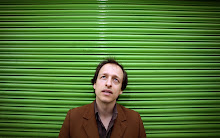The first thing I see is a youth's afro hair whipped up to look something approximating a 99 ice cream. He is wearing plus fours and breeches. His lady looks like Bonnie Parker.
That gives me hope. That puts a smile on my face. I am in amongst the freaks and the weirdos, the dreamers. The jazz fans. The jazz professors, too. Because we are down in that corner of jazz that is out there, vulnerable, that can be attacked from all sides and for which one can never offer a substantial defence. This is free jazz.
This is Ornette Coleman. The man who took jazz in a direction so outside the mainstream, so outside ordinary consciousness, that the reputation of a music that started in the dance halls of New Orleans never truly recovered.
His support act sets things up nicely. On they come in their little white turban/fez/hats and green gowns, eight of them, four playing drums, four playing Moroccan oboes. Those oboes come out like a squall, like a call to prayer across a muslim town. And the drums, the drums play in no rhythm I have ever heard, dense polyrythms, on and on, repetitive, remorseless until you enter a trance-like state. After some period of time, they exit stage left, still playing, heads bobbing, The Master Musicians of Jajouka.
After a needless break, Ornette is introduced. He ambles on, all 79 years of him on display, in a blue silk suit. His son is on drums, and an acoustic double bass and an electric bass make up the quartet. The sound that comes from his horn is instantly there, instantly Ornette. He has the ear for the tuneful melody, and an ear for distortion, he can play both sweet and harsh.
He has a free attitude to instruments. He has a sax, a trumpet and a violin by his side, and makes late decisions about which to play. He might pick his trumpet up, think better of it then lay it on his lap, and play his violin instead. And if you get the violin, you get a violent scraping over the top of his tight, tight band. If you get the trumpet, you might get a flourish, a suggestion of a tune, a small flight, and then an abrupt full stop. And if you get the saxophone, you might get anything at all.
He finishes the opening part of his set with a straight ahead swinging number that could have been out of the Ellington songbook (I don't know), and then on comes cock-sock-rock-surf-chili-pepper Flea, in black suit, skinny black tie and white trainers. First things first, the man can play, we know that, but in Ornette's group?
Yes he can. Okay, he plays the bass with arms wrapped around it like a surfing gorrilla, he can't contain his body from moving around, hyperactive, but he can play, mostly within himself, only letting off the occasional funk riff for which he is famed.
Back on stage come the Master Musicians and we are headed for a 20-minute African, jazz-funk collaboration. I saw Spiritualized and Sonic Youth 'collaborating' on that same Royal Festival Hall stage. They made a lot of noise, it went on for ages and I got so wiped out by the sheer droniness of it that I fell asleep. This started off little different, the sound was muddy and the two bands were side by side, apart. But after quite a while (we had some walkouts) they got it together, they found that jamming rhythm and it worked. They lost it and found it again, and those men from Morocco gave it up and it was all handshakes.
It got stripped down to a trio for the encore. It was a very sweet version of one of those songs from the Shape of Jazz to Come, just Ornette, really, a man with a saxophone and a soul playing it for love.
Sunday, 21 June 2009
Subscribe to:
Post Comments (Atom)

No comments:
Post a Comment